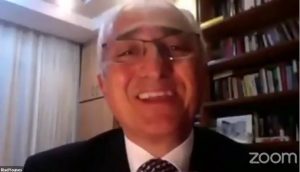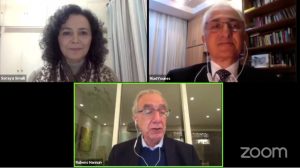São Paulo – Intermittent fasting of 14 to 16 hours can boost the immune system, help control blood sugar, as well as reducing weight, belly fat, blood pressure, cholesterol and systemic inflammation, among other benefits. That is what Dr. Riad Younes, director-general at the Oncology Center of Hospital Oswaldo Cruz said in the first culture and health webinar hosted by the Arab Brazilian Chamber of Commerce in partnership with the Institute of Arab Culture (ICArabe) last Friday (16) night. The topic was “The immune and health benefits of intermittent fasting.”
In his talk, Younes said that, “In addition to the COVID-19 pandemic, the world is going through another epidemic that must be fought: obesity.” He said that last year alone 4.8 million people died from obesity-related problems, which accounted for 8% of the deaths in the period. “Little more than a third of the population is overweight, and 13% is obese – it’s a global public health problem,” he said.
The doctor said that, as the weight increases, so do the chances of diseases such as diabetes, asthma, arthritis, high blood pressure and even cancer. “It’s not just about aesthetics, we have to be careful,” he said.
Younes added that, during years, the doctors’ recommendations for losing weight was to count the calories of the diet, eat less and exercise more. “Most recently, the focus has changed from quality to the time you eat, which is now as important as what you eat,” he said.
In the intermittent fasting, you can drink water and sugar-free beverages such as coffee and tea. The benefits listed by Younes are weight loss, decrease in the intake of calories, candies, alcohol and sugary drinks. “It also helps control blood sugar and reduce blood sugar spikes,” he said.

A study from January 2020 evaluated overweight people with diabetes and high cholesterol. They fasted for 14 hours for 12 weeks. “The study saw a decrease in weight, waist circumference, belly fat, blood pressure, cholesterol and glycated hemoglobin,” Younes said. It can also reduce systemic inflammation, one of the major causes of metabolic syndrome, he says, particularly when fasting starts in the evening, after 5 pm.
The fasting can also improve markers of cardiovascular diseases, blood pressure, heart rate, cholesterol, blood sugar, insulin, as well as increasing longevity and reduce the occurrence of serious diseases such as cancer and obesity, Younes said in the webinar.
Another benefit of the practice is the autophagy, a cellular “self-cleansing” that can improve the chances to fight several diseases such as cancer. “The cellular cleansing helps make our lives longer, eliminates cell-killing components and delays the onset of degenerative diseases such as Parkinson’s, Alzheimer’s, and others,” Federal University of São Paulo (Unifesp) president and ICArabe founder Soraya Smaili said during the webinar.
“Inducing autophagy is important for the survival of cells. Autophagy starts into two hours of fasting and peaks into six. After 12 hours, a degradation process starts, so we can’t extend the fasting for much longer than 12 hours, as it can cause cell death instead of autophagy. The ideal is between 6 and 12 hours to not harm the cell,” Smaili said.
Riad Younes added, “When fasting for 12 hours, we are not without food for 12 hours. Everything remains normal for several hours, then it starts to decline, so you can fast for 14 to 16 hours,” the doctor said.

The most adopted model of intermittent fasting is fasting for 16 hours and eating for 8 hours, Younes said. During the fast, only water and sugar-free drinks are allowed. The benefits include reducing blood pressure, cholesterol and its derivatives, as well as the risks for heart attack, stroke and cancer.
When breaking fast, it’s important to eat a balanced diet, limit the intake of sugar and alcohol, and give preference to whole foods. “The fast came to break with some traditional dogmas, such as the idea that breakfast is the most important meal of the day and that the quality of the diet is the most important,” Younes said. Both he and Smaili said that they follow the intermittent fasting.
But fasting is not for all. The practice is not recommended for patients with unstable and hard-to-manage diabetes, people over 70 and under 16, pregnant women, patients with cardiovascular illness, chronic kidney disease, anorexia, bulimia, as well as too skinny or fragile people or those that have been hospitalized recently.
Ramadan
Ramadan is the holy month of Islam when Muslims go on a fast from sunup to sundown. This year’s started on April 23 and will end on May 23. “The fast of Ramadan ranges between 13 to 18 hours, everyday for 30 days, and you can eat whatever you want at night, for 6 to 11 hours. It’s an intermittent fasting, after all you don’t eat anything for a period, but with some differences. The fasting is during the day and you can’t drink fluids, which can cause a slight dehydration, and you can eat whatever you want at night,” Younes said.
The practitioners of Ramadan lose an average of 1.5 kg after this period but recover the weight within less than a month. Cholesterol also decreases a little. “It doesn’t have a particular diet. The immunity decreases a little, but not enough to increase the risk of COVID-19 infection – you can fast without any problem,” Younes said. Restrictions are for patients with chronic diseases as well as diabetes, nephropathy and cardiovascular patients.
Smaili pointed out the key role of Islam for the scientific advance, encouraging knowledge, studies and science by founding libraries, translating old texts and establishing the first universities as well as the first hospital as a treatment and education facility. “Science is as important as prayers – it’s a saying from those times that has never been so pertinent, especially today,” she said.
Riad Younes is also the Marketing vice president at the Arab Chamber. Arab Chamber president Rubens Hannun opened the panel. “The Arab Chamber aims at connecting Arabs and Brazilians for the economic, social and cultural development, and we know that culture and health are a great foundation for business and the development and the growth of people and societies,” he said.
Translated by Guilherme Miranda




